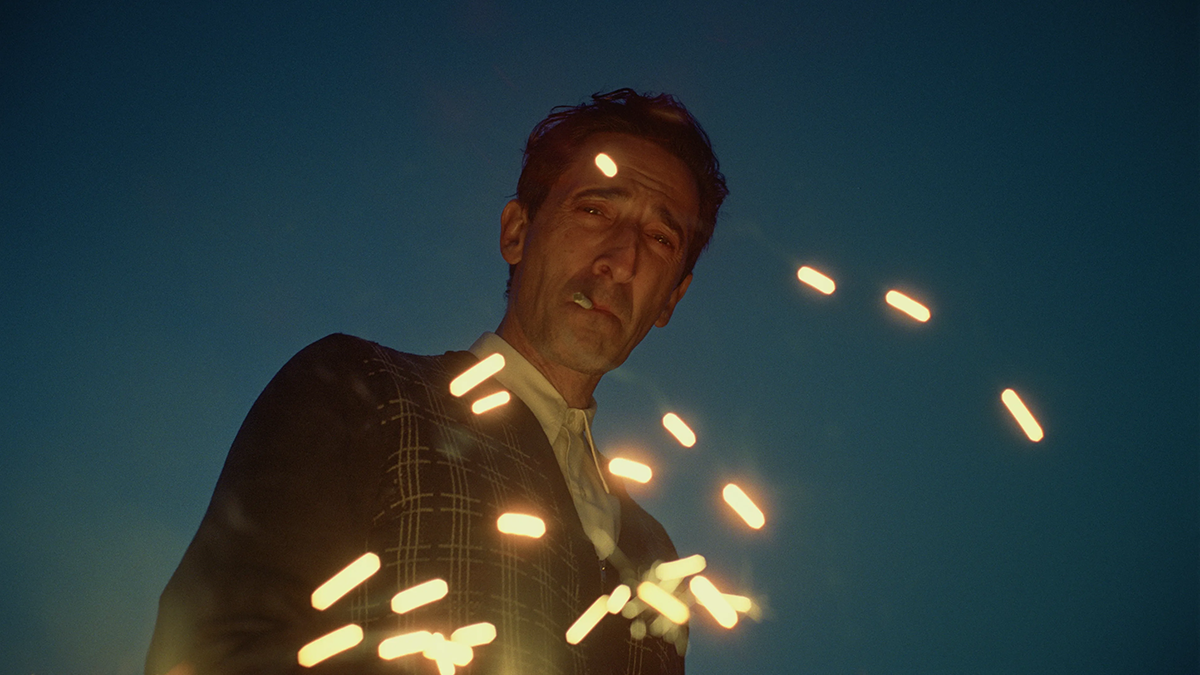I cried in the middle of the street on my first day working for an NGO in Madrid. A Ukrainian boy told me his story – he had survived the war and was now walking alone in the roads of a country that was not his own, with a language he barely understood. His whole family was killed.
At times, his story overshadows the many experiences I heard, although none is any less valuable than the other. The reality is that war is only one side of a painful problem that echoes in the foreigners’ offices, on the bus, in the supermarket. So, the story of László Tóth, a fictional character created for The Brutalist, seems not so fictional to me after all.
The Brutalist recreates the immigrant’s journey in a devastating and frank way. In the first part, László arrives at a place of promise that soon begins to crumble while the physical, spiritual, and mental scars are still fresh. He seems to be lucky at the beginning – a cousin takes him in at his store’s warehouse. He gives László a temporary roof over his head and work, but the situation is complicated.
László gets in the way of the life his cousin is charting with an American wife who, though polite at first, lacks empathy. For them, László is a reminder of the Jewish heritage they are trying to erase, so they cut him out of their lives. This is how, after a series of unfortunate events, László becomes homeless again and takes a hard job in construction. It’s a bitter consolation for him after being an architect with a successful career that was interrupted by the war.
László’s story, although fictional, is more present than ever. Migration cases often speak of complicated processes involving despair, fear, and uncertainty. Many immigrants and refugees must leave their past behind to start from scratch and put food on the table again. Many are forced to forget their profession or hide their identity. The Brutalist explores how people and countries, especially the United States, have uncomfortable histories with immigrants.
Migrants may believe they’re finding a new beginning in an unknown land, but the place where they land does not necessarily care about them. In real life, I meet María, a medical doctor praying for a call back to work temporarily in a clothing store. Carlos is an engineer with over 30 years of experience, who now drives a cab. Verónica is a lawyer who walks six miles a day to sell a product that no one wants. Waiting to get through immigration at the airport, Lina gets a message – the bedroom she had reserved at her cousins’ house is no longer available. The list is an oversimplification. You can hear stories like these around the world, from people of all kinds of backgrounds. The Brutalist encompasses many in its sentiment.
Meanwhile, Lászlo seems lucky enough when a benefactor, Harrison Lee Van Buren (Guy Pearce), takes him under his wing. He can once again call himself an architect on a big project that promises to boost his career. However, Harrison is a self-made man and collector who now wants to collect László. To that end, he buys his time and mind and takes him into an unpleasantly frivolous world where wealth is measured only by possessions, and where the pain of others, such as that of a Holocaust survivor, is simplified to a mere curiosity at the dinner table. László’s spiral of destruction intensifies when Harrison makes clear he sees himself as László’s owner.
But László remains committed to his art, as a testament to his humanity. When László cedes his earnings from the project to finish every architectural detail the way he wants, his wife understands, even though the financial situation is not ideal for them. None of the businessmen were tempted to make the same sacrifice.
The Brutalist’s director and screenwriter, Brady Corbet, knows something about this particular phenomenon. Migrants are not the only ones with financial problems aspiring to slow-coming stability. Independent filmmakers are also struggling. Corbet recently opened up about how many workers in the industry can’t afford rent. In fact, he admitted to not having received any money for the film at the moment, while the movie’s promotion has kept him away from other paying jobs for months at a time. Even awards don’t guarantee financial stability in Hollywood.
For a $10 million film with this narrative ambition, it seems absurd that The Brutalist would be embroiled in a controversy over using AI. Let’s put it in context: only Hungarians would have known that Adrien Brody’s (László) accent wasn’t perfect. How many movies and series have you seen with people who barely speak a language pretending to be native speakers and everyone buys it? That’s the extent of Corbet’s commitment to the film – he used AI to improve Brody’s accent and make the film more authentic, even if the deficiency would only be noticeable to a small percentage of the film’s audience.
AI or not, Corbet is trying to capture complex – the scars of war, the pain of family separation, and the rupture of immigration. These are the issues we should be talking about when talking about The Brutalist and the truths it reveals.

